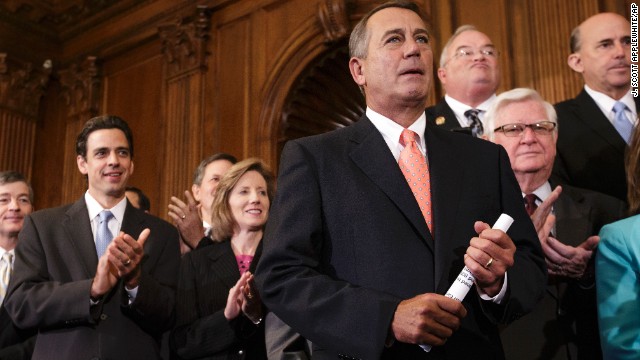 Speaker John Boehner, R-Ohio -- The coach. He'll make the key play call. The top Republican leader in the land may be the most important player in the days immediately before a possible shutdown. Boehner could decide whether to push through the Senate's version of a spending bill and keep government running, or he could float a third version with some other Republican wish list items in it. If he takes the second option, Boehner could risk a shutdown but could also force the Senate into a tough position: give House Republicans something or send federal workers home. Timing on all this will be critical.
Speaker John Boehner, R-Ohio -- The coach. He'll make the key play call. The top Republican leader in the land may be the most important player in the days immediately before a possible shutdown. Boehner could decide whether to push through the Senate's version of a spending bill and keep government running, or he could float a third version with some other Republican wish list items in it. If he takes the second option, Boehner could risk a shutdown but could also force the Senate into a tough position: give House Republicans something or send federal workers home. Timing on all this will be critical. 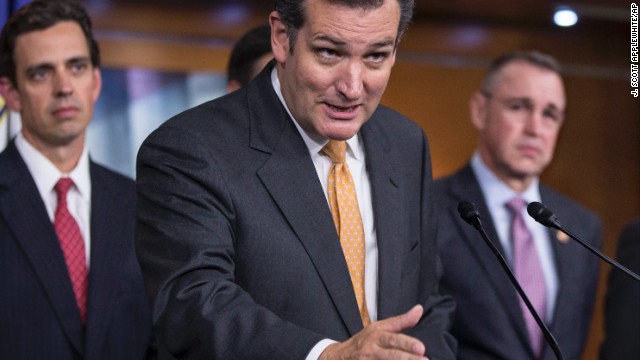 Sen. Ted Cruz, R-Texas -- The revolutionary or rabble rouser, depending on your viewpoint. The tea party firebrand could lead a long filibuster on the Senate floor, delaying passage of a spending bill until just one day before the deadline on Monday, September 30. Cruz has stoked the anti-Obamacare flames all summer, but recently angered fellow Republicans by openly saying that the Senate does not have the votes to repeal the health care law.
Sen. Ted Cruz, R-Texas -- The revolutionary or rabble rouser, depending on your viewpoint. The tea party firebrand could lead a long filibuster on the Senate floor, delaying passage of a spending bill until just one day before the deadline on Monday, September 30. Cruz has stoked the anti-Obamacare flames all summer, but recently angered fellow Republicans by openly saying that the Senate does not have the votes to repeal the health care law. 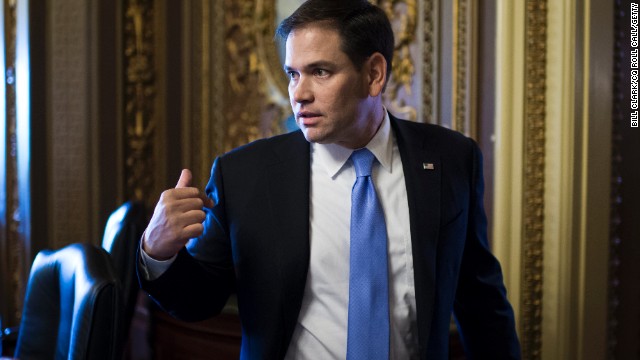 Sen. Marco Rubio, R-Florida -- Senator to watch. The potential presidential candidate has been one of three senators (Cruz and Mike Lee, R-Utah, being the others) pushing to use the government shutdown debate as a way to repeal or defund Obamacare. But watch his actions and language as a shutdown nears to see if he digs in or if downshifts at all.
Sen. Marco Rubio, R-Florida -- Senator to watch. The potential presidential candidate has been one of three senators (Cruz and Mike Lee, R-Utah, being the others) pushing to use the government shutdown debate as a way to repeal or defund Obamacare. But watch his actions and language as a shutdown nears to see if he digs in or if downshifts at all. 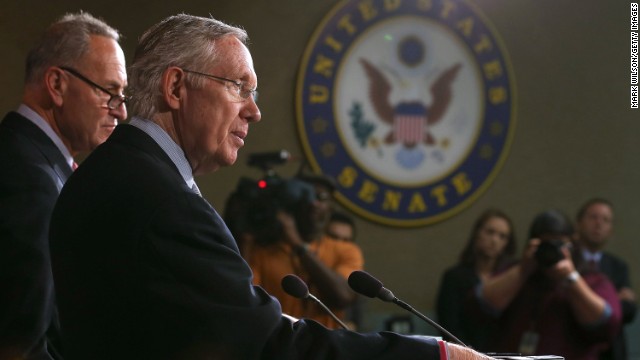 Sen. Harry Reid, D-Nevada -- The man steering the ship in the Senate. Master at using Senate procedure to his advantage, Reid is the main force in controlling the voting process in the chamber and ensuring that an attempted filibuster by tea party-types fails. The majority leader will be a primary negotiator if we reach phase three, if the House does not accept the Senate spending bill.
Sen. Harry Reid, D-Nevada -- The man steering the ship in the Senate. Master at using Senate procedure to his advantage, Reid is the main force in controlling the voting process in the chamber and ensuring that an attempted filibuster by tea party-types fails. The majority leader will be a primary negotiator if we reach phase three, if the House does not accept the Senate spending bill. 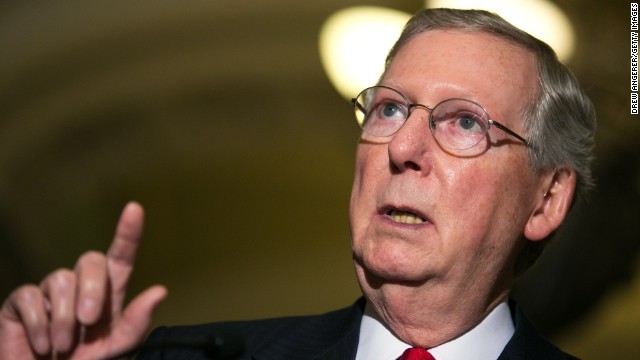 Sen. Mitch McConnell, R-Kentucky -- If Reid steers the ship, McConnell controls the headwinds. Which is good news for Reid, at least initially. The Republican leader and several of his members say they will vote against Cruz's filibuster and in favor of a spending bill with no limits on Obamacare. Meaning, in favor of a bill that just funds government. McConnell generally has been leery of running into a shutdown or default. In fact, one legislative method for avoiding default is named after him.
Sen. Mitch McConnell, R-Kentucky -- If Reid steers the ship, McConnell controls the headwinds. Which is good news for Reid, at least initially. The Republican leader and several of his members say they will vote against Cruz's filibuster and in favor of a spending bill with no limits on Obamacare. Meaning, in favor of a bill that just funds government. McConnell generally has been leery of running into a shutdown or default. In fact, one legislative method for avoiding default is named after him. 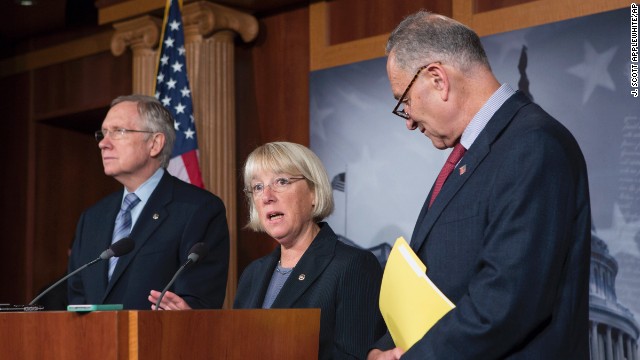 Sen. Patty Murray, D-Washington -- The consigliore. Murray, center, does not seek the outside limelight, but the Senate Budget Committee chairwoman is a major fiscal force behind the scenes on Capitol Hill. Known by fellow Democrats as a straight shooter, she is also an experienced negotiator, having co-chaired the laborious, somewhat torturous and unsuccessful Super Committee.
Sen. Patty Murray, D-Washington -- The consigliore. Murray, center, does not seek the outside limelight, but the Senate Budget Committee chairwoman is a major fiscal force behind the scenes on Capitol Hill. Known by fellow Democrats as a straight shooter, she is also an experienced negotiator, having co-chaired the laborious, somewhat torturous and unsuccessful Super Committee. 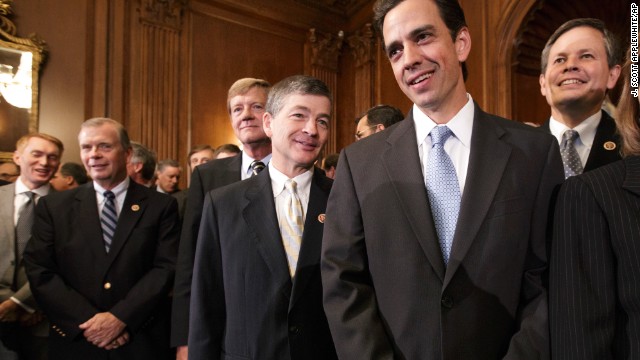 Rep. Tom Graves, R-Georgia -- The new militia leader. The freshman congressman from Georgia, second from right, is one reason the debate has reached this point. Graves led the charge that blocked the original proposal by House Republican leaders. That would have kept government funded and had a detachable portion on Obamacare. Instead Graves and other conservatives forced their leaders to pass a spending bill with a mandatory defunding of Obamacare.
Rep. Tom Graves, R-Georgia -- The new militia leader. The freshman congressman from Georgia, second from right, is one reason the debate has reached this point. Graves led the charge that blocked the original proposal by House Republican leaders. That would have kept government funded and had a detachable portion on Obamacare. Instead Graves and other conservatives forced their leaders to pass a spending bill with a mandatory defunding of Obamacare. 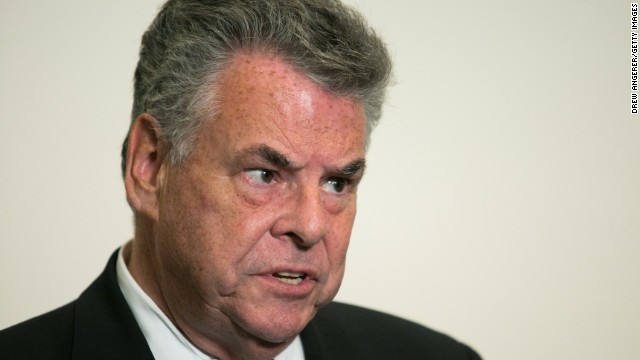 Rep. Peter King, R-New York -- The blunt statesman. King is outspoken against many tea party tactics, calling the move to tie Obamacare to the must-pass spending bill essentially a suicide mission and Cruz "a fraud." He is pushing for Republicans to accept a more "clean" spending bill that can pass the Senate and avoid a shutdown.
Rep. Peter King, R-New York -- The blunt statesman. King is outspoken against many tea party tactics, calling the move to tie Obamacare to the must-pass spending bill essentially a suicide mission and Cruz "a fraud." He is pushing for Republicans to accept a more "clean" spending bill that can pass the Senate and avoid a shutdown. 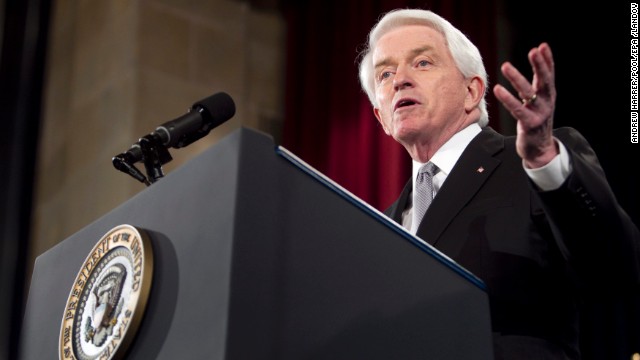 Thomas Donohue, president and CEO of the U.S. Chamber of Commerce -- The heavy. Donohue is known for his deep connections and his aggressive lobbying on behalf of business. He and the Chamber are urging Republican lawmakers to avoid a shutdown. The Chamber is an important political backer for conservatives, but has had mixed success with the current Congress, locking in firm anti-tax positions but unable to push through immigration reform so far.
Thomas Donohue, president and CEO of the U.S. Chamber of Commerce -- The heavy. Donohue is known for his deep connections and his aggressive lobbying on behalf of business. He and the Chamber are urging Republican lawmakers to avoid a shutdown. The Chamber is an important political backer for conservatives, but has had mixed success with the current Congress, locking in firm anti-tax positions but unable to push through immigration reform so far. 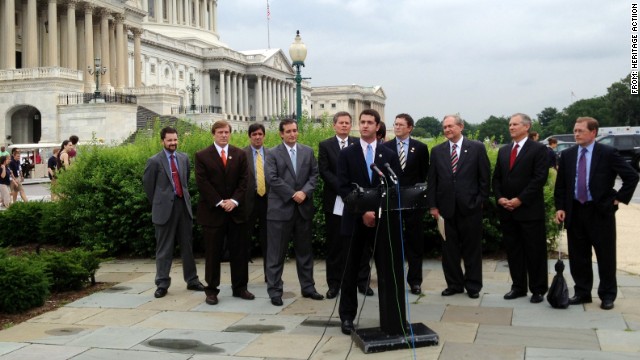 Michael Needham, president of Heritage Action -- The driving force. Needham runs the political offshoot of the conservative Heritage Foundation and has been unrelenting in urging lawmakers to repeal Obamacare. He has told Republicans not to fear a potential shutdown, saying they would suffer more politically from allowing Obamacare to continue.
Michael Needham, president of Heritage Action -- The driving force. Needham runs the political offshoot of the conservative Heritage Foundation and has been unrelenting in urging lawmakers to repeal Obamacare. He has told Republicans not to fear a potential shutdown, saying they would suffer more politically from allowing Obamacare to continue. 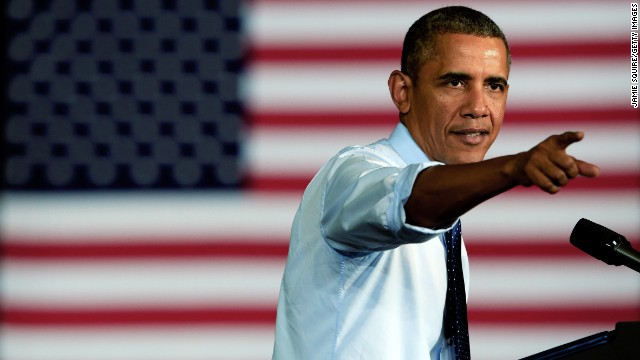 President Barack Obama -- The campaigner and CEO. Expect the president to use his podium more as a shutdown nears, aiming at public opinion as Democrats in Congress position themselves. If House Republicans send back a new proposal close to the September 30 deadline, the president and Democrats will have to decide what move to make next.
President Barack Obama -- The campaigner and CEO. Expect the president to use his podium more as a shutdown nears, aiming at public opinion as Democrats in Congress position themselves. If House Republicans send back a new proposal close to the September 30 deadline, the president and Democrats will have to decide what move to make next. 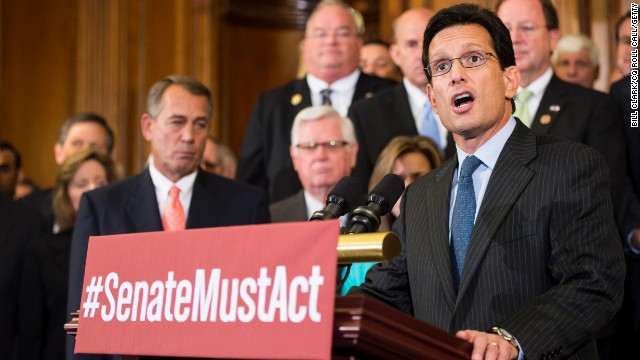 Rep. Eric Cantor, R-Virginia -- The powerful lieutenant. Cantor, the House Republican No. 2, is much more closely allied with conservatives and tea party members in the House than is Speaker Boehner. The two have not always agreed on every strategy during potential shutdown debates, but have been in public lockstep during the current go-around.
Rep. Eric Cantor, R-Virginia -- The powerful lieutenant. Cantor, the House Republican No. 2, is much more closely allied with conservatives and tea party members in the House than is Speaker Boehner. The two have not always agreed on every strategy during potential shutdown debates, but have been in public lockstep during the current go-around. 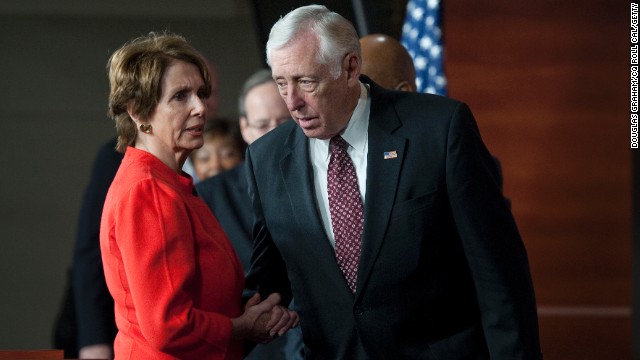 Rep. Nancy Pelosi, D-California, and Steny Hoyer, D-Maryland -- Players on deck. The top two House Democrats are mostly watching and waiting. But they will play a critical role once Boehner decides his next move. They could either bring Democratic votes on board a deal or be the loudest voices against a new Republican alternative. Hoyer will be interesting to watch; he has strongly opposed both the House and Senate plans as cutting too much in spending.
Rep. Nancy Pelosi, D-California, and Steny Hoyer, D-Maryland -- Players on deck. The top two House Democrats are mostly watching and waiting. But they will play a critical role once Boehner decides his next move. They could either bring Democratic votes on board a deal or be the loudest voices against a new Republican alternative. Hoyer will be interesting to watch; he has strongly opposed both the House and Senate plans as cutting too much in spending. 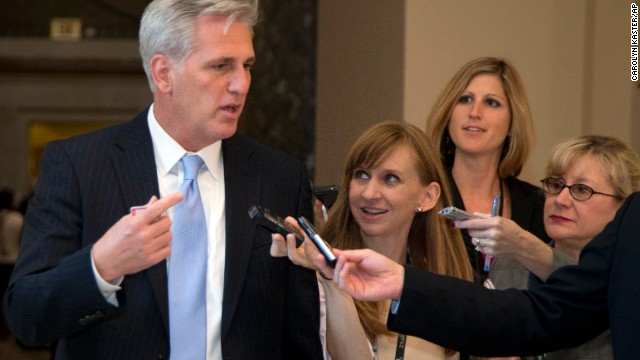 Rep. Kevin McCarthy, R-California -- The numbers guy. McCarthy, the House whip, has the tricky job of assessing exactly where Republican members stand and getting the 217 votes it takes to pass a bill in the chamber. He is known for his outreach to and connection with many of the freshmen House members who align with the tea party.
Rep. Kevin McCarthy, R-California -- The numbers guy. McCarthy, the House whip, has the tricky job of assessing exactly where Republican members stand and getting the 217 votes it takes to pass a bill in the chamber. He is known for his outreach to and connection with many of the freshmen House members who align with the tea party. 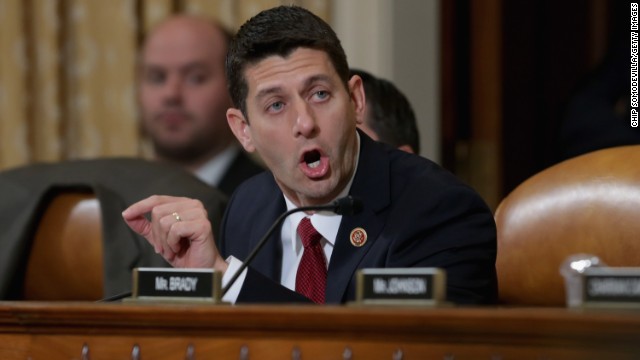 Rep. Paul Ryan, R-Wisconsin -- Member to watch. The vote of the House budget chairman and former vice presidential nominee is an important signal both within Republican ranks and to the public at large. Ryan has voted against some funding measures in the past, including the emergency aid for Superstorm Sandy recovery. But he was a "yes" on the last extension of the debt ceiling.
Rep. Paul Ryan, R-Wisconsin -- Member to watch. The vote of the House budget chairman and former vice presidential nominee is an important signal both within Republican ranks and to the public at large. Ryan has voted against some funding measures in the past, including the emergency aid for Superstorm Sandy recovery. But he was a "yes" on the last extension of the debt ceiling. 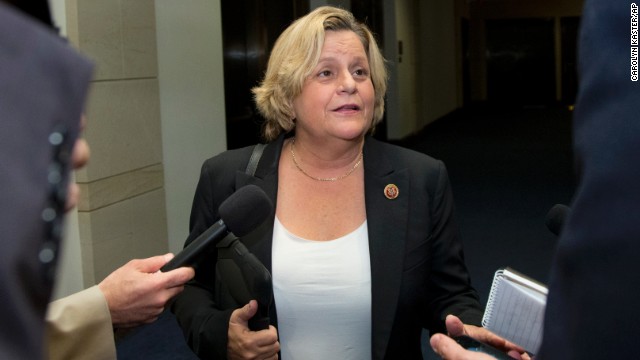 Rep. Ileana Ros-Lehtinen, R-Florida -- Another member to watch. A former committee chairwoman (Republican rules have term limits for committee chairs), Ros-Lehtinen knows House politics and procedure inside out. Depending on the issue, she has been described as a conservative or moderate, and occasionally as a libertarian.
Rep. Ileana Ros-Lehtinen, R-Florida -- Another member to watch. A former committee chairwoman (Republican rules have term limits for committee chairs), Ros-Lehtinen knows House politics and procedure inside out. Depending on the issue, she has been described as a conservative or moderate, and occasionally as a libertarian. - The federal government is facing a potential government shutdown next week
- Meanwhile, if debt ceiling isn't raised, the government will soon be unable to pay its debts
- Many are confused about the difference between the two and their link to Obamacare
- The Affordable Care Act is being used as a bargaining chip in both debates
Washington (CNN) -- With a series of potential disasters hovering over the nation like a demon storm, the most prominent words of a Washington-based word cloud would be: government shutdown, continuing resolution, debt limit and Obamacare.
Although a potential shutdown and the need to raise the debt limit are different issues, they are interrelated and have one big thing in common: they are both products of a crisis manufactured by Washington. And both are being used for leverage in attempts to undermine Obamacare.
So, what's the difference between them and why should you care?
Government shutdown: Again? Seriously?
First up, the shutdown
The federal government's fiscal year starts next week -- October 1. And Congress' one key duty laid out in the Constitution is to pass spending bills that fund the government.

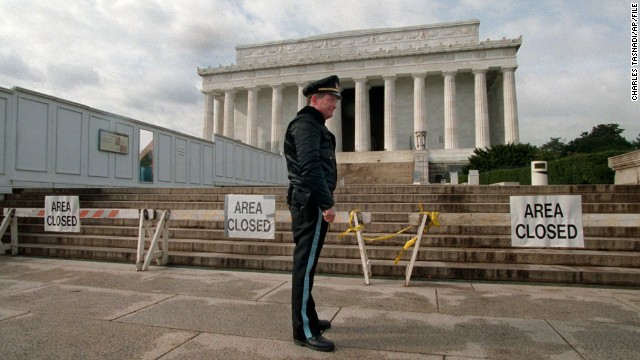 A Park Service police officer stands guard in front of the Lincoln Memorial during a partial shutdown of the federal government in November 1995. Many government services and agencies were closed at the end of 1995 and beginning of 1996 as President Bill Clinton battled a Republican-led Congress over spending levels.
A Park Service police officer stands guard in front of the Lincoln Memorial during a partial shutdown of the federal government in November 1995. Many government services and agencies were closed at the end of 1995 and beginning of 1996 as President Bill Clinton battled a Republican-led Congress over spending levels. 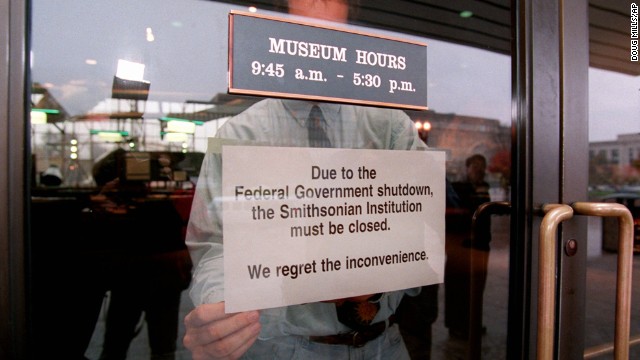 An employee hangs a sign on the door of the Smithsonian's National Air and Space Museum in Washington on November 14, 1995, marking the start of the government shutdown.
An employee hangs a sign on the door of the Smithsonian's National Air and Space Museum in Washington on November 14, 1995, marking the start of the government shutdown.  A tourist peers out a ferry window at the Statue of Liberty on November 14, 1995, as a small group of visitors wait on the dock to board the vessel. No passengers were allowed off the boat as both the Statue of Liberty and Ellis Island were closed after federal workers were sent home.
A tourist peers out a ferry window at the Statue of Liberty on November 14, 1995, as a small group of visitors wait on the dock to board the vessel. No passengers were allowed off the boat as both the Statue of Liberty and Ellis Island were closed after federal workers were sent home. 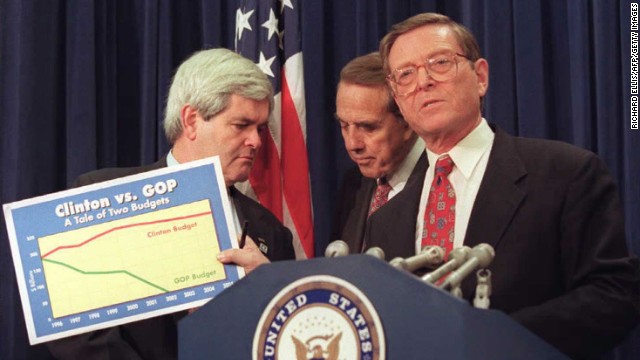 Sen. Pete Domenici, R-New Mexico, chairman of the Senate Budget Committee holds up a chart showing the differences between Republican and Democratic budgets as Speaker of the House Newt Gingrich, left, and Senate Majority Leader Bob Dole stand by during a press conference on Capitol Hill.
Sen. Pete Domenici, R-New Mexico, chairman of the Senate Budget Committee holds up a chart showing the differences between Republican and Democratic budgets as Speaker of the House Newt Gingrich, left, and Senate Majority Leader Bob Dole stand by during a press conference on Capitol Hill. 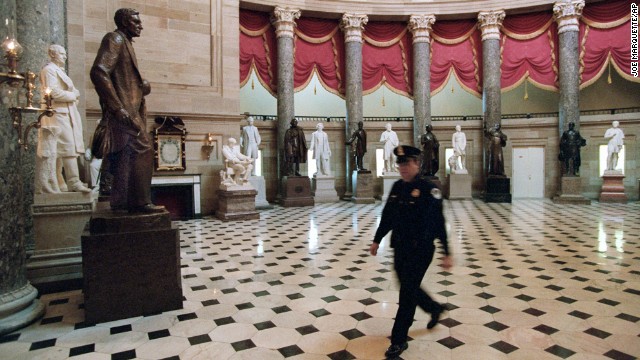 A police officer walks through the empty Statuary Hall in the Capitol on November 15, 1995.
A police officer walks through the empty Statuary Hall in the Capitol on November 15, 1995.  The national debt clock in New York is stopped during the government shutdown in November.
The national debt clock in New York is stopped during the government shutdown in November. 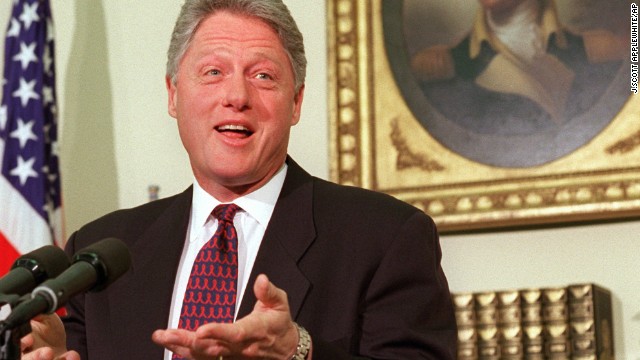 President Clinton speaks about the federal budget impasse from the Oval Office on November 16, 1995. The first part of the budget shutdown ended on November 19 when a temporary spending bill was enacted. But Congress failed to come to an agreement on the federal budget, leading to a second shutdown starting December 16.
President Clinton speaks about the federal budget impasse from the Oval Office on November 16, 1995. The first part of the budget shutdown ended on November 19 when a temporary spending bill was enacted. But Congress failed to come to an agreement on the federal budget, leading to a second shutdown starting December 16. 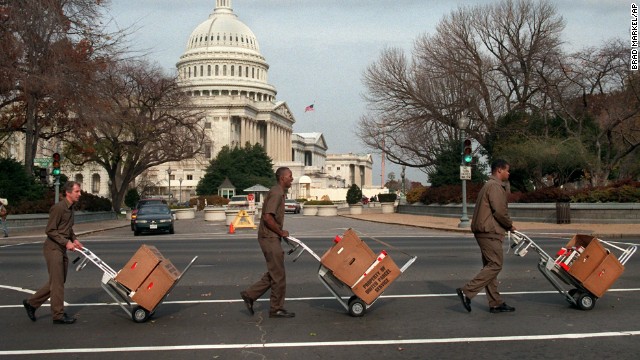 UPS workers deliver letters to members of Congress on November 28, 1995. The letters were written and sent by members of the Coalition For Change, a nonpartisan organization devoted to balancing the budget.
UPS workers deliver letters to members of Congress on November 28, 1995. The letters were written and sent by members of the Coalition For Change, a nonpartisan organization devoted to balancing the budget. 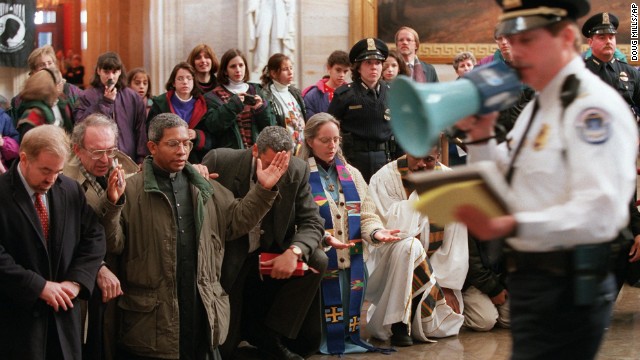 A speaks to demonstrators at the Capitol Rotunda on December 7, 1995. Evangelical leaders from around the country held a prayer session to call on legislators to treat the poor justly during welfare reform and budget negotiations.
A speaks to demonstrators at the Capitol Rotunda on December 7, 1995. Evangelical leaders from around the country held a prayer session to call on legislators to treat the poor justly during welfare reform and budget negotiations.  House Appropriations Committee Chairman Rep. Bob Livingston, right, holds a "closed" sign outside the National Gallery of Art in Washington on December 18, 1995.
House Appropriations Committee Chairman Rep. Bob Livingston, right, holds a "closed" sign outside the National Gallery of Art in Washington on December 18, 1995. 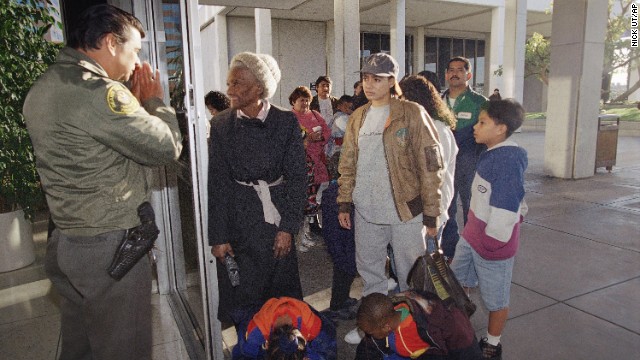 A security guard informs people that the passport office is closed at the Federal Building in Los Angeles on December 18, 1995.
A security guard informs people that the passport office is closed at the Federal Building in Los Angeles on December 18, 1995.  Rep. John Boehner dumps out coal, which he called a Christmas gift to President Clinton, during a news conference about the federal budget on December 21, 1995.
Rep. John Boehner dumps out coal, which he called a Christmas gift to President Clinton, during a news conference about the federal budget on December 21, 1995. 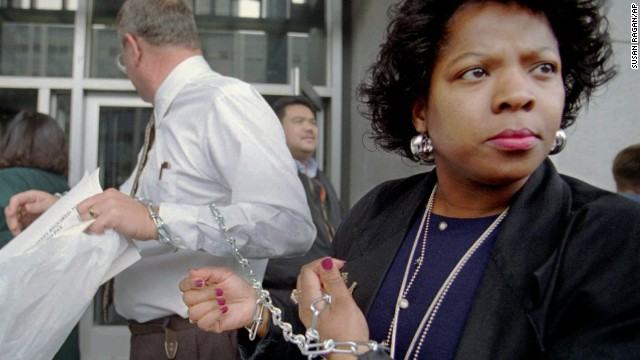 Karen Bishop chains herself to colleagues during a rally at the Federal Building in San Francisco on January 3, 1996. The workers claimed they were in servitude to the government as hundreds of thousands of federal employees were either furloughed or had to work without pay.
Karen Bishop chains herself to colleagues during a rally at the Federal Building in San Francisco on January 3, 1996. The workers claimed they were in servitude to the government as hundreds of thousands of federal employees were either furloughed or had to work without pay.  Food service employees at the Veterans Hospital in Miami line up to receive food rations on January 3, 1996. Many federal employees faced financial hardships during the shutdown.
Food service employees at the Veterans Hospital in Miami line up to receive food rations on January 3, 1996. Many federal employees faced financial hardships during the shutdown. 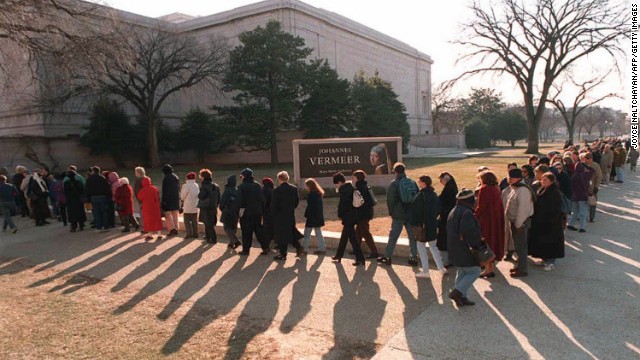 Tourists line up outside the National Gallery of Art in Washington on January 5, 1996. It was one of the few government buildings open during the shutdown thanks to the assistance of private funds.
Tourists line up outside the National Gallery of Art in Washington on January 5, 1996. It was one of the few government buildings open during the shutdown thanks to the assistance of private funds. 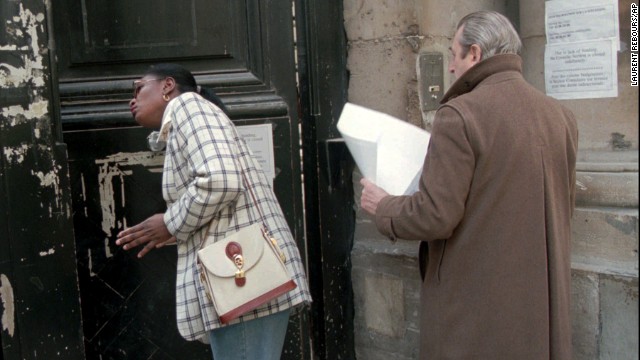 People trying to apply for visas at the U.S. consulate in Paris on January 5, 1996, are told that the building is closed because of the U.S. budget crisis.
People trying to apply for visas at the U.S. consulate in Paris on January 5, 1996, are told that the building is closed because of the U.S. budget crisis. 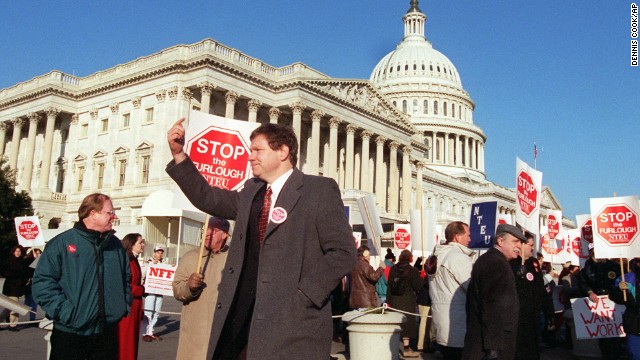 Rep. Thomas Davis III, R-Virginia, attends a rally in Washington on January 5, 1996, urging the end of the government shutdown.
Rep. Thomas Davis III, R-Virginia, attends a rally in Washington on January 5, 1996, urging the end of the government shutdown.  Tourists view Yosemite National Park in California after it re-opened on January 6, 1996. Early that morning, President Clinton signed Republican-crafted legislation to restore jobs and provide retroactive pay to government workers while he and Congress continued negotiating how to balance the federal budget.
Tourists view Yosemite National Park in California after it re-opened on January 6, 1996. Early that morning, President Clinton signed Republican-crafted legislation to restore jobs and provide retroactive pay to government workers while he and Congress continued negotiating how to balance the federal budget. The last government shutdown
The last government shutdown
The last government shutdown
The last government shutdown
The last government shutdown
The last government shutdown
The last government shutdown
The last government shutdown
The last government shutdown
The last government shutdown
The last government shutdown
The last government shutdown
The last government shutdown
The last government shutdown
The last government shutdown
The last government shutdown
The last government shutdown
The last government shutdown
 Photos: The last government shutdown
Photos: The last government shutdown 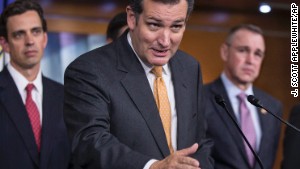 Sen. Ted Cruz's war on Obamacare
Sen. Ted Cruz's war on Obamacare 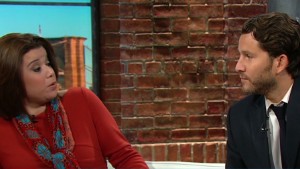 Will Sen. Ted Cruz's strategy backfire?
Will Sen. Ted Cruz's strategy backfire?  Foes go all out to undermine Obamacare
Foes go all out to undermine Obamacare  Government's latest shutdown showdown
Government's latest shutdown showdown If it doesn't, most of the functions of the government -- from paying the military to funding small business loans to collecting the trash in Washington -- could come to a slow-motion halt.
It shuts down.
This time around, the House of Representatives, led by conservative Republicans, has linked this funding process -- known as a continuing resolution -- to defunding President Barack Obama's signature health insurance law, the Affordable Care Act or Obamacare. It passed its bill last Friday and sent it to the Senate.
This week, the Senate is expected to strip out the anti-Obamacare provision and pass its own "clean" version of the bill -- and then the drama begins.
But more on that in a minute.
What's important here is that if Congress doesn't pass the $986 billion continuing resolution, or CR, in the next week, the national parks could close, airport Transportation Security Agents might get furloughed and agents might be unable to process Social Security checks.
10 ways a government shutdown would affect your daily life
Next crisis, the debt limit
Remember that time when you maxed out your credit card? That's what the debt limit is all about. The U.S. is on the verge of maxing out its $16.699 trillion credit card.
A maxed-out credit card doesn't mean you can stop spending. While you have to pay your credit card bill, you also have to continue to buy groceries and pay the electric bill, so you might have to open up a new credit card.
That's similar to what the U.S. government must do. The government can't just stop paying on its previous debt or spending money, even though its credit limit is maxed out, because it has too many obligations to meet. It has to have access to money to pay for the interest on that debt, as well as pay soldiers' paychecks, doctors' Medicare reimbursements, expenses like bridge repairs, and so on. So the president must ask Congress to raise the limit of the country's credit card, or debt limit.
But many think Republicans in Congress may also try to link raising the debt limit to defunding Obamacare. Sound familiar?
Sometime around the middle of October -- unless Congress votes to raise the debt limit -- the U.S. government will be out of options. This past spring it already implemented "extraordinary measures" where accounts were reshuffled to enable the U.S. to continue paying its bills.
But this time, once the debt limit is reached, there are no other tricks Treasury can use. It won't be able to meet 30% of its obligations, according to a report by the Bipartisan Policy Center.
Although the government won't "shut down," many say the consequences would be much, much worse.
Treasury Secretary Jack Lew predicted that impacts on the global and local economy would be "catastrophic."
While the U.S. operates at a deficit, the rest of the world purchases U.S. debt. It's considered one of the safest investments around, because it is believed that the U.S. will always pay its bills. But what if it doesn't?
The U.S. will no longer be considered "the most reliable creditor in the world," said Shai Akabas, senior policy analyst at the Bipartisan Policy Center. In addition to potential financial panic because the most stable investment will no longer be considered safe, individual investors, hedge fund managers, other countries -- those who own U.S. Treasurys -- could start to turn to other countries for investments, and interest rates on Treasurys would start to increase.
That means the benefits that U.S. consumers enjoy, including low interest rates on home loans, credit cards and business loans, would begin to erode. Fast.
At home, it would also be devastating. That 80-year-old woman who relies on her Social Security check to pay her rent might not get paid. That means her landlord won't get paid.
The doctor who sees Medicare patients won't get reimbursed, so he might not purchase that new flat-screen TV he was planning on buying next month. The government contractor who is owed for providing food at military bases won't get paid, and she will have to lay off line cooks.
Obviously, this could be very, very bad. That's why each side thinks the other will blink on Obamacare to avoid such a calamity.
What happens if the government shuts down
So what does Obamacare have to do with any of this?
In short: a lot.
While the health care law is not directly tied to funding the government -- the CR -- or paying bills already incurred -- the debt ceiling -- it is being used as a powerful bargaining chip.
A group of Republicans, led by freshman Sen. Ted Cruz of Texas, despises the health care law so much that it is willing to risk government shutdown or default.
While 41 previous attempts to repeal, defund or stop the law haven't worked, the group hopes efforts to link it to these two pieces of must-pass legislation will. That's why there's talk of a government shutdown.
The House, which is controlled by Republicans, voted on a measure that would fund the government until December 15 -- but in exchange for keeping the government open, the health care law would be defunded.
But the Democrat-controlled Senate vows that Obamacare defunding will have no part in efforts to keep the government running and is expected to strip that provision out of its version of the CR sometime this week.
Cruz and his supporters aren't backing down. And neither is the president.
"I believe we should stand our ground, and I don't believe (Senate Majority Leader) Harry Reid or Barack Obama should shut down the federal government," Cruz said on Fox News Sunday. "The House voted last week to fund the federal government. If Harry Reid kills that, Harry Reid is responsible for shutting down the government."
But many within the Republican Party think Cruz's idea is a terrible one. While Republicans have successfully extracted budget cuts from recent battles over government funding and the debt ceiling, most understand that a political poison pill like this is unlikely to succeed. Democrats control the Senate with their 54-seat majority.
"We are not about to shut the government down over the fact that we cannot -- only controlling one house of Congress -- tell the president that we are not going to fund any portion of this, because we can't do that," Sen. Tom Coburn, Republican of Oklahoma, said on CBS's "Face the Nation."
If Democrats win the battle over government funding and Obamacare stays intact, Republicans indicated they will make similar demands when the president asks to raise the debt limit.
But Obama has repeated numerous times that he will not negotiate on the debt limit either.
"We will not negotiate whether or not America should keep its word and meet its obligations. We're not going to allow anyone to inflict economic pain on millions of our own people just to make an ideological point," Obama said at the Congressional Black Caucus awards dinner this past weekend.
And even if Cruz and his supporters somehow overcame the Democrat-controlled Senate and successfully sent a bill to the president's desk that defunds Obamacare, would Obama really sign a bill that guts his signature legislative achievement?
And so we have the showdown.